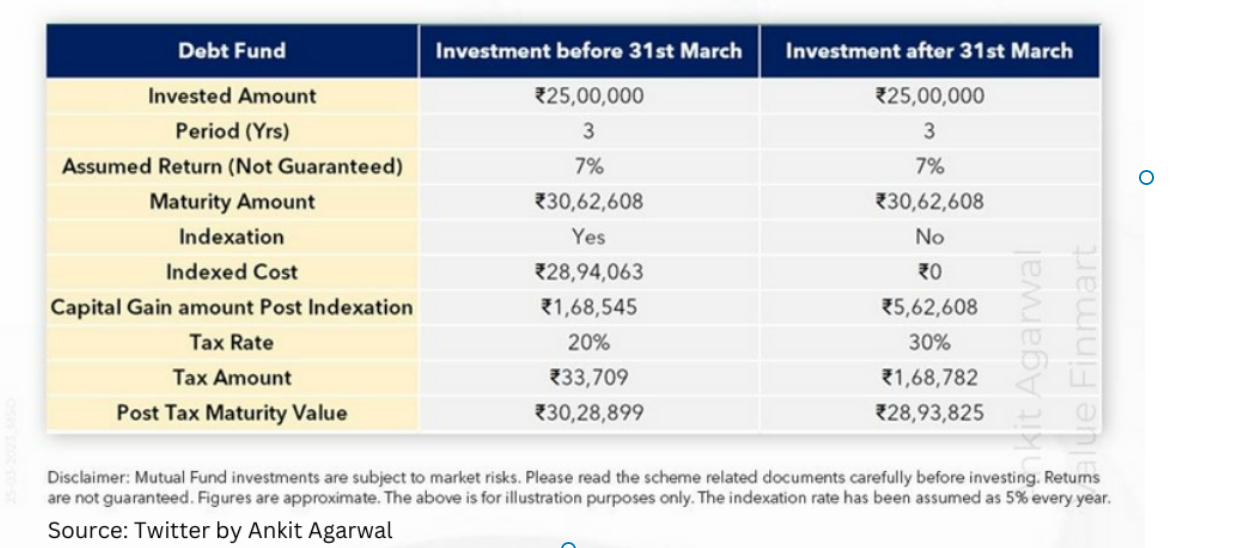The tax benefits on long-term debt mutual funds are eliminated as per an amendment to the Finance Bill, effective from 1st April 2023. New investors who will hold debt mutual funds for 3+ years will now have their capital gains taxed as per their respective income tax slabs, losing the indexation advantage that differentiates debt mutual fund’s long-term capital gains from short-term capital gains.
New investors who want to dabble in the debt mutual fund market are now welcomed with a new, bitter rule – indexation benefits on long-term capital gains will be scrapped to essentially eliminate the concept of short and long-term capital gains from such non-equity mutual funds.
This comes as a blow to one of the most popular mutual fund categories which were preferred by investors for its relatively safe returns to beat inflation, low-moderate risk factor, and indexation benefits.
Indexation Benefit – Simplified!
Assuming that an investment of Rs. 10 lakhs was made in a debt mutual fund scheme in 2020 and redeemed in 2023, with a growth in value to Rs. 12 lakhs, the investor would be liable for capital gains tax on their profits. Opting for indexation would reduce the tax liability.
Indexation is a technique that adjusts the purchase price of an asset for inflation. The government of India publishes an annual inflation index called the Cost Inflation Index (CII). By using this index, you can adjust the purchase price of your debt mutual fund investment for inflation.
Assuming the CII for 2020-21 is 301 and the CII for 2022-23 is 350, the indexed purchase price of your investment will be calculated as follows:
Indexed Purchase Price = (Actual Purchase Price) x (CII of the year of sale / CII of the year of purchase)
So, in our example, the indexed purchase price will be:
Indexed Purchase Price = Rs. 10 lakhs x (350/301) = Rs. 11.69 lakhs
Therefore, your taxable capital gains will be calculated as Rs. 12 lakhs – Rs. 11.69 lakhs = Rs. 31,000 only, and you will be taxed only on this amount, rather than the entire profit of Rs. 2 lakhs.
This is how indexation benefits work in debt mutual funds. By adjusting the purchase price for inflation, it reduces the tax liability of investors, which makes it a more tax-efficient investment option for those in higher tax brackets.
But once the new rule is effective on April 1, taxation on such debt funds for new investors will not only be on par with fixed deposits but long-term capital gains will also be taxed equal to short-term capital gains basis the income tax slabs.
Not just the investors though, this also hurts distributors who, until now, actively pitched debt mutual funds against FDs and earned commissions or service fees for advice.
Taxation Change Impact
- Debt mutual funds AUM could slow down
- NBFCs will be the biggest losers
- Bank deposits will be the biggest gainers
- Government will earn more via taxes

According to CLSA, nearly Rs 8 lakh crores are invested in debt mutual funds and about 11-14% of revenue for mutual fund companies comes from the fee charged on those investments. If investments in this product slow down, revenue growth is bound to get hampered.
The bond market will also feel the impact. When companies need to borrow money, they can issue bonds that are bought by debt mutual funds. This competition between debt mutual funds and banks to lend money to companies has helped companies get better rates. However, if investors stop investing in debt mutual funds, companies will have to go back to borrowing from banks, which could result in higher interest rates charged by banks. This could hurt the corporate bond market, as companies may find it harder and more expensive to borrow money.

_ Upendra Kinhal
Director Of Investments, Assetmonk
What Options Do Investors Have Now?
Given that investors lack a compelling reason to invest in debt mutual funds, it’s worth examining the three asset classes that industry experts recommend as other options.
| Fixed Deposits | Structured Debt | Sovereign Gold Bond | |
| Liquidity | Easy liquidity through loan against banks or break the FD by paying penalty | Can be liquidated as they come with a guaranteed exit clause at the end of tenure | Limited liquidity due to the time clause and special exit window. |
| Volatility | Nil | Nil | Nil |
| Avg Returns | 6% | 16-18% | 7% |
Conclusion
At the end of the day, investment is all about consistent returns and portfolio diversification is the way to face the ongoing challenges prevalent in the volatile financial markets. If you are looking to invest in a high-yielding asset class for stable returns and low risk, start a conversation with Assetmonk’s investment advisors, to explore one of its key product offerings in structured debt products from upcoming private markets that offer an exceptional assured IRR of 17% with definite terms.
Not only that, these investment products outperform equity instruments in both volatility and returns. Plus, are curated from a huge pool of products available in the market and are always backed by the appreciable asset collateral and monitored by a SEBI-registered trustee, giving you peace of mind.





 Listen to the article
Listen to the article
